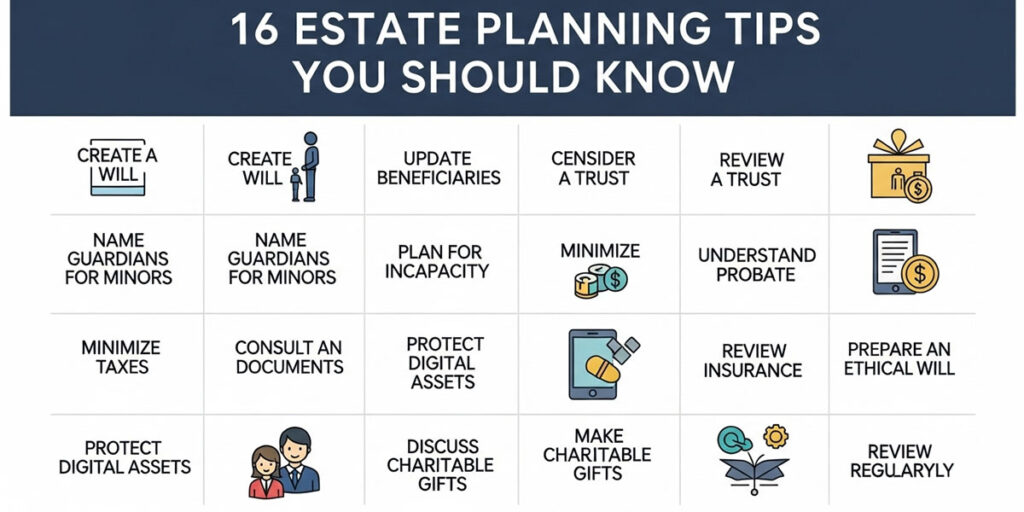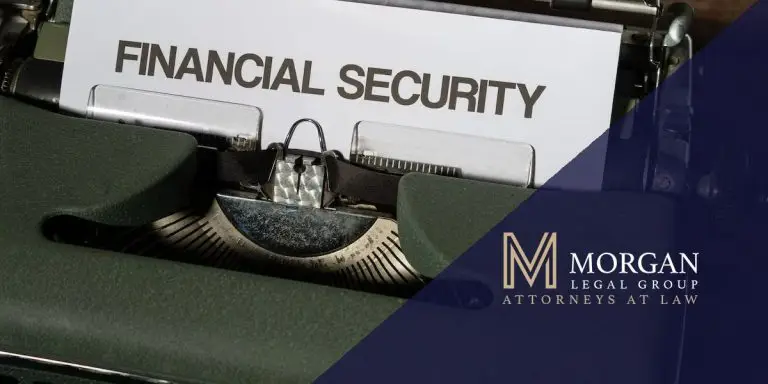A Lawyer’s Guide: 16 Essential Tips for Your NY Estate Plan
Estate planning is the process of arranging for the management and disposal of your assets during your life and after your death. It’s about much more than just deciding who gets your property; it’s about protecting your loved ones, preserving your wealth, and ensuring your legacy is handled exactly as you wish. Many people view estate planning as something only for the very wealthy or the elderly. This is a dangerous misconception. Every adult in New York, regardless of age or net worth, needs an estate plan.
With over 30 years of experience helping New Yorkers craft comprehensive estate plans, I have witnessed firsthand the profound peace of mind that a well-designed plan provides—and the chaos, expense, and family conflict that result from a lack of planning. The process can seem daunting, but it is manageable with the right guidance. To help you start this crucial journey, the legal team at Morgan Legal Group has compiled this list of 16 essential tips. This is not just a checklist; it’s a strategic roadmap to securing your family’s future.
1. Understand That Everyone Needs a Plan
The first and most important tip is to accept that you need an estate plan. It doesn’t matter if you are 25 or 75, single or married, have a modest apartment or a portfolio of properties. If you own anything or have people who depend on you, you need a plan. Without one, you die “intestate,” and New York State law will make all the decisions for you. A court will decide who inherits your assets and who is appointed to raise your minor children, and these outcomes may be drastically different from what you would have wanted. Planning is about control—taking control of your own legacy.
2. A Will is the Foundation, But It’s Not the Whole House
A Last Will and Testament is the cornerstone of most estate plans. It’s where you name your beneficiaries, nominate an Executor to manage your estate, and, most critically, appoint a guardian for your minor children. However, it’s a mistake to think a will is all you need. A will only controls assets that are in your name alone and do not have a beneficiary designation. Furthermore, a will guarantees that your estate will go through the public court process known as probate. A comprehensive plan often involves other tools, like trusts, to achieve goals that a will cannot, such as avoiding probate.
3. Master Your Assets: The Inventory is Key
You cannot plan for what you don’t know you have. Before you can make any decisions, you must create a detailed inventory of all your assets and debts. This includes:
- Real Estate: Your primary home, vacation properties, rental properties.
- Financial Accounts: Checking, savings, brokerage accounts, certificates of deposit.
- Retirement Plans: 401(k)s, IRAs, pensions.
- Life Insurance Policies: Both term and whole life policies.
- Business Interests: Ownership in any partnership, LLC, or corporation.
- Tangible Personal Property: Vehicles, jewelry, art, collectibles.
- Digital Assets: Cryptocurrency, valuable domain names, monetized online accounts.
This inventory is the blueprint for your entire estate plan and will be invaluable to your family and the attorney helping you.
4. Review Your Beneficiary Designations Religiously
Many of your most valuable assets—like your IRA, 401(k), and life insurance—pass outside of your will according to the beneficiary designation form you filled out. These designations supersede your will. If your will leaves everything to your current spouse, but your old 401(k) from a previous job still names your ex-spouse, your ex-spouse will get the money. It’s a common and devastating mistake. Review these forms every few years and especially after any major life event like a marriage, divorce, or birth of a child. This is a critical component of any wills and trusts strategy.
5. Plan for Incapacity, Not Just Death
A good estate plan protects you while you are alive as much as it provides for your family after you’re gone. What happens if an accident or illness leaves you unable to make financial or medical decisions for yourself? Without a plan, your family would have to go through a costly and public guardianship proceeding to get a court’s permission to manage your affairs. You can avoid this by having two key documents:
- A Durable Power of Attorney: This document allows you to appoint someone you trust (your “agent”) to make financial decisions on your behalf if you cannot.
- A Health Care Proxy: This allows you to appoint an agent to make medical decisions for you if you are incapacitated.
These documents are just as important as your will.
6. Understand the Power of Trusts
Trusts are not just for the ultra-wealthy. A Revocable Living Trust is a powerful tool for the average New Yorker. By transferring your assets into a trust, you can achieve several key goals:
- Probate Avoidance: Assets in a trust pass to your heirs privately and efficiently, without the cost, delay, and public scrutiny of probate court.
- Incapacity Planning: If you become incapacitated, your chosen successor trustee can immediately step in and manage the trust assets for your benefit, without court intervention.
- Control Over Distributions: You can specify how and when your beneficiaries receive their inheritance, protecting it from their creditors or a divorce.
Discussing with an attorney whether a trust is right for you is a crucial step. The team at Morgan Legal Group can help you make this determination.
7. Choose Your Fiduciaries with Extreme Care
Your estate plan relies on people you appoint to carry out your wishes. These people are called “fiduciaries.” This includes your Executor (in your will), your Trustee (of your trust), your Agent under a Power of Attorney, and your Health Care Agent. These roles require integrity, organization, and good judgment. Do not choose someone simply because they are the oldest child or live nearby. Consider who is most trustworthy, responsible, and capable of handling the pressure. Always name at least one successor for each role in case your first choice cannot serve.
8. Parents of Minors: Naming a Guardian is Your #1 Priority
If you have children under 18, the most important decision you will make in your estate plan is nominating their guardian. Your will is the only place you can legally do this. If you fail to do so, a judge who does not know you or your family will make this life-altering decision. Discuss your choice with the potential guardian beforehand to ensure they are willing and able to take on this profound responsibility. This single issue often drives the need for careful planning, intersecting with family law considerations.
9. Consider “How” Your Heirs Will Inherit
Leaving a large, lump-sum inheritance to a young adult or someone who is not financially responsible can be a recipe for disaster. Instead of an outright distribution, consider leaving the inheritance in a trust for their benefit. You can structure the trust to distribute funds at certain ages (e.g., 1/3 at 25, 1/3 at 30, and the rest at 35) or keep it in a lifetime trust to provide asset protection from creditors, lawsuits, and divorce. This thoughtful approach shows true care. This is a topic to discuss when you schedule an appointment with a planner.
10. Integrate Elder Law and Long-Term Care Planning
For those in or nearing retirement, estate planning is not just about death; it’s about life. The astronomical cost of long-term care in New York can wipe out a lifetime of savings. A key part of modern estate planning involves elder law strategies to protect your assets while helping you qualify for Medicaid to cover nursing home costs. This often involves using specialized irrevocable trusts, but it must be done well in advance due to a five-year look-back period. Ignoring this can be a multi-hundred-thousand-dollar mistake. It also helps protect against elder abuse by putting assets in a protected structure.
11. Address Your Digital Assets
In 2024, a significant part of our lives exists online. Your estate plan must address your “digital assets.” This includes everything from social media accounts and photos stored in the cloud to more valuable assets like cryptocurrency, blogs with ad revenue, or domain names. New York has laws governing how your Executor can access these accounts. Your plan should include a list of your important digital assets and passwords (stored securely) and give your Executor explicit authority to manage them.
12. Organize Your Documents and Your Life
A perfect estate plan is useless if your family can’t find it or doesn’t know where to start. Create a “letter of instruction” or a binder that contains:
- The location of your original will, trust, and other legal documents.
- A copy of your asset inventory.
- Contact information for your attorney, financial advisor, and accountant.
- A list of your online accounts and passwords (or instructions on how to access them).
- Instructions regarding your funeral and burial wishes.
This organizational step is an incredible gift to your grieving family. It provides clarity in a time of chaos.
13. The Dangers of DIY and Online Forms
The rise of online legal document websites has created a minefield for the public. While cheap, these one-size-fits-all templates cannot provide legal advice or account for the complexities of New York law. A DIY will can easily be executed improperly, fail to coordinate with your beneficiary designations, or create unintended tax consequences. The money you “save” on a cheap online will could cost your heirs tens of thousands of dollars in legal fees to fix the problems it creates. As the experts at Investopedia note, estate planning is a detailed process that requires professional expertise.
14. Understand New York’s Estate Tax “Cliff”
While the federal estate tax exemption is very high (over $13 million in 2024), New York has its own state estate tax with a much lower exemption ($6.94 million in 2024). Crucially, New York has a “cliff.” If your estate is worth more than 105% of the exemption amount, you don’t just pay tax on the overage; you pay tax on the *entire* estate. For example, an estate worth $7.3 million doesn’t just pay tax on the amount over $6.94 million; the entire $7.3 million becomes taxable. This makes tax planning a critical component for many New Yorkers, even those who consider themselves “well-off” but not “rich,” especially those in high-cost areas like New York City.
15. Talk to Your Family (When Appropriate)
While the contents of your estate plan are private, it can be helpful to have conversations with key people. You absolutely must talk to the people you want to name as guardians, executors, or trustees to ensure they are willing to serve. For some families, discussing the general outline of the plan with adult children can prevent surprises and hurt feelings later on. However, this depends heavily on your family dynamics. A good estate planning attorney can help you strategize about what to communicate and to whom.
16. Review and Update Your Plan Regularly
Your life is not static, and neither is your estate plan. A plan you created ten years ago may no longer reflect your wishes or your financial situation. It’s essential to review your estate plan with your attorney every 3-5 years, or immediately after any major life event:
- Marriage, divorce, or remarriage.
- The birth or adoption of a child or grandchild.
- The death of a spouse, beneficiary, or fiduciary.
- A significant change in your financial situation.
- A move to a different state.
A proactive review ensures your plan remains a relevant and effective tool for protecting your legacy.
Your Legacy is a Project, Not a Document
Effective estate planning is an ongoing process, not a one-time event. It is one of the most important projects you will ever undertake for yourself and your loved ones. By following these tips and working with a dedicated professional, you can create a plan that provides security, clarity, and true peace of mind.
At Morgan Legal Group, we are committed to being your lifelong partners in this process. We don’t just draft documents; we build relationships and provide counsel that evolves with your life. Our team, led by seasoned attorneys like Russel Morgan, Esq., has the expertise to handle every facet of your plan with the care it deserves.
Don’t leave your family’s future to chance. Take control of your legacy today. Contact Morgan Legal Group to start the conversation and build a plan that stands the test of time. Learn more about our client-focused approach by visiting us on Google.







